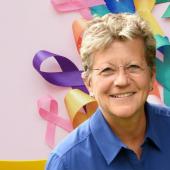In this episode of Curbside Consult on Breast Cancer with Dr Lise Alschuler, we’re exploring the therapeutic interventions for early stage breast cancer, which is when most practitioners will encounter their patients for the first time.
We're going to explore what the patients can expect at these early stages and then how practitioners can complement their treatment and make them more comfortable.
Key Take-Aways
Defining Early stage Breast Cancer
Most commonly, early stage breast cancer refers to cancer that's confined as a local disease. So local meaning it's in the breast tissue, but it could be in the regional, local ipsilateral breast lymph nodes. So it might be just in the breast tissue, it might be in the breast tissue as well as in the lymph nodes.
What can the patients expect in terms of symptoms?
Most early stage breast cancer is asymptomatic. It can also present with a palpable lump that's somewhat painful. There can be breast discharge, that's unusual.
There can be kind of a dimpling of the skin, which is where the tumor tissue, as it's creating inflammation, it kind of retracts the skin. So it creates these dimples in the skin. Sometimes women will palpate lymph nodes or feel some congestion.
Mental health impacts
With the diagnosis, there are lots of issues that come up. Now, some of these issues are related to the diagnosis itself, but I would say more commonly the issues come about as a result of a combination of the treatments that are used for breast cancer.
There are always mental and emotional issues with the shock of the diagnosis, but there are also issues that can arise along the way as women engage in treatments for the cancer typically.
For early stage breast cancer, what are patients going through at the hospital?
A woman would be diagnosed with breast cancer, consult with a surgeon, and then decide whether to have a lumpectomy or a partial mastectomy. Depending on several factors, a woman might then be recommended for radiation therapy.
Radiation therapy
There are different types of radiation therapy. Most radiation therapy is still what we call external beam radiation, which is delivered from the outside and from various locations and converges on the target tissue.
Sometimes women can get brachytherapy depending on if they qualify. Brachytherapy is a form of radiation therapy where a sealed radiation source is placed inside or next to the area requiring treatment.
What can our patients expect with radiation therapy?
There have been a lot of advances in this arena, particularly with breast cancer. Radiation now is generally delivered in what's called a dose dense format, so a woman might be able to get a week's worth of radiation. And that's usually enough.
Some women do need a longer course, maybe up to four weeks or six weeks or sometimes eight weeks of radiation. It's typically done every day. Monday through Friday, they get the weekends off in those longer courses.
The actual treatment itself is completely painless. Over time, some women will experience some dermatitis, so they'll have some inflammation of their skin. There are great naturopathic ways that we can support women to minimize that, and there's lots of options that they're given from their conventional docs as well.
Because radiation does generate cell death, it creates inflammation. So the inflammatory reaction can cause some fatigue. Sometimes people can get digestive issues, not because the radiation is affecting the digestive system directly, typically, but because of the inflammatory reaction.
Once a woman has radiation, they need to be a little bit vigilant for some late effects that may impact lung and heart tissue. But all in all, it's fairly well tolerated.
Genetic Analysis
After the surgical removal of the tumor, more and more you'll see that some of that tumor tissue is sent away for genetic analysis.
The most common cause of hereditary breast cancer is an inherited mutation in the BRCA1 or BRCA2 gene. In normal cells, these genes help make proteins that repair damaged DNA. Mutated versions of these genes can lead to abnormal cell growth, which can lead to cancer.
Based on the score of that genetic test, which is basically measuring the expression activity of a panel of genes, a woman is determined to be a candidate or not for chemotherapy.
If a woman has HER2 positive breast cancer, they would also be started on some medications earlier in the sequence of events, notably Trastuzumab and Pertuzumab that target the HER2 receptor.
Some of the sequencing is thrown off with this “neoadjuvant chemotherapy”. So based on imaging, some women will get chemotherapy upfront in an effort to shrink the tumor or the lymph nodes so that they can be a candidate for less extensive surgery and maybe avoid radiation.
Genetic testing is a beautiful thing in oncology because it saves many, many women from getting needless chemotherapy.
Endocrine Therapy
If it's an estrogen receptor positive breast cancer, they will then go into endocrine therapy, which is anti-estrogen therapy. Endocrine therapies can go on for five, seven or ten years, depending on various factors.
Endocrine therapy has really transformed the prognosis of breast cancer. It used to be a death sentence pretty much, but now it's a 95%+ five year survival rate.
However, some women don't want to do it and or can't tolerate it. So this is a discussion that definitely is going to happen with naturopathic doctors. It's really important to have a very clear understanding when you're engaging in this conversation, because ultimately it is the woman's choice.
However, we need to be very clear about what that endocrine therapy is offering.
Endocrine Therapy: Pros & Cons
With either Tamoxifen or if a woman is post-menopausal, some kind of aromatase inhibitor, will result typically in a risk reduction of about 50%. So if a woman's risk of recurrence is 30%, after five or ten years of endocrine therapies, her risk would go from 30% to 15%.
For most women that's enough of a risk reduction to completely endorse the therapy. However, for some women, that's not enough, especially if they're starting risk is low.
The statistics are important as one part of conversation in the context of what a woman might experience as a result of taking these therapies, because they're not necessarily benign therapies.
Endocrine therapy basically take estrogen out, which creates instant menopause. Plus, there's issues with tolerance of the medication itself, so that's really where it gets to be complicated for women.
A lot of women will seek our natural remedies because they don’t want to go into instant menopause. While we do have lots of natural ways to reduce the risk of recurrence, there is no nothing that is equal to those endocrine therapies. So it's very important not to make that guarantee.
We have to be just very careful with our language and very cognizant of what we're counseling and how we're helping women arrive at their decision.
The opinions expressed in this Nutramedica program are those of the guests and contributors. They do not necessarily reflect the opinions of Nutritional Fundamentals For Health Inc.
This video is intended for licensed or registered health professionals and students of health professions only. These statements have not been evaluated by the Food and Drug Administration. Information contained in these programs is not intended to diagnose, treat, cure, or prevent any disease.



